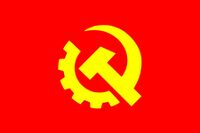Communist Party of Bengal
This article is incomplete because it is pending further input from participants, or it is a work-in-progress by one author. Please comment on this article's talk page to share your input, comments and questions. Note: To contribute to this article, you may need to seek help from the author(s) of this page. |
Communist Party of Bengal বাংলার কমিউনিস্ট পার্টি | |
|---|---|
 Party flag and Logo | |
| Abbreviation | CPB |
| Leader | Naba Kumar Ghosh |
| President | Shital Kumar Mukherjee |
| First Secretary | Naba Kumar Ghosh |
| Founder | Sarat Chandra Bose |
| Founded | July 21, 1951 |
| Preceded by | Communist Party of India |
| Headquarters | Rasbihari Avenue, Kolkata |
| Newspaper | Ganakantha (গণকণ্ঠ) |
| Student wing | Students' Federation of Bengal |
| Youth wing | Democratic Youth Federation of Bengal |
| Women's wing | Womens' Democratic Association of Bengal |
| Membership (2019) | 1,586,568 |
| Ideology | |
| Political position | Left-wing to Far-left |
| International affiliation | The Communist International |
| Colors | Red |
| Slogan | "Nothing but People's Rule!" |
| Members of NA | 151 / 294
|
| Members of PAs | 394 / 742
|
| Members of MAs | 3,541 / 8,745
|
The Communist Party of Bengal (Bengali: বাংলার কমিউনিস্ট পার্টি ; CPB) is a communist and socialist political party in Bengaala.
Established in 1951, it is the oldest political party in Bengal, and the strongest political party electorally (since 1997). The party played an important role in the Bengali independence movement and remained either the second largest or largest political force ever since. The party is currently lead by first secretary Naba Kumar Ghosh.
History
Foundation (1947-1949)
The Communist Party of Bengal was founded by Sarat Chandra Bose. Bose had overseen the merger of the AIFB and CPI in 1947 just before Indian independence, and remained supportive of a Communist India until independence. He had won the leadership of CPI Bengal in 1948, but still grew more and more critical of the Indian state and even CPI, as he concluded the CPI had "succumbed" to electoralism and the "bourgeois" Indian state. The failure of the Indian state to prevent partition of Bengal along religious lines and the dominance of the central government over federal subjects gave rise to dissent in the state of West Bengal and created popular separatist movement. The communists of Bengal capitalised on the dissent and took leadership of the movement. The dissatisfied national leadership of the CPI immediately expelled Bose, who formed a new party thereafter named "Communist Party of Bengal". He opened the door of the party towards all kind of anti-fascists and anti-capitalists, including even reformists. Bose asserted his will that he wished the independence movement of Bengal to be led only by anti-capitalists and anti-fascists. The new party was subsequently joined by the vast majority of the regional wing of the CPI. The CPI's Bengali wing ceased to exist by 1949, as only 150-200 members were left as per official reports.